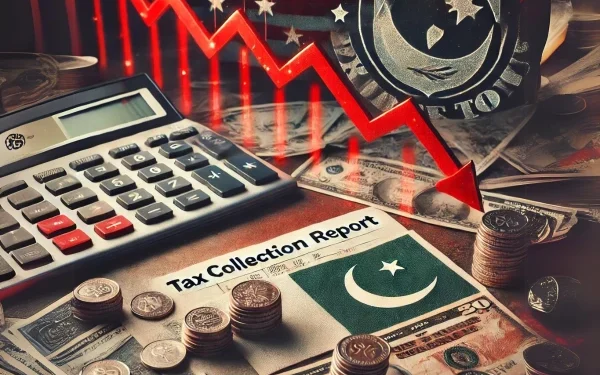Islamabad: Pakistan’s tax deficit has widened to Rs 730 billion in the first nine months of the current fiscal year, posing a serious risk to the country’s commitment to the International Monetary Fund (IMF). The shortfall, which surged by Rs 100 billion in March alone, threatens Pakistan’s pledge to the IMF, where authorities had assured that the tax gap would not exceed Rs 640 billion compared to the original target.
Despite a notable 28% increase in tax collection compared to the previous fiscal year, the Federal Board of Revenue (FBR) has struggled to meet the ambitious revenue targets set for the period. The shortfall underscores the challenges facing Pakistan’s economic managers as they strive to stabilize the economy while meeting the IMF’s stringent fiscal conditions.
Tax Collection Performance Falls Short
According to tax officials, the FBR has collected Rs 8.44 trillion in taxes by the last working day of March. While this figure marks a significant improvement from the previous fiscal year, it remains far from the projected target. The revenue collection target for July-March was set at Rs 9.17 trillion, meaning that the FBR has fallen short by Rs 730 billion.
Similarly, for March alone, the tax collection target was Rs 1.219 trillion, but the government could only manage to collect Rs 1.1 trillion, despite efforts to slow down tax refunds to boost net revenue.
Slow Refunds and Revenue Impact
One of the key strategies employed by the government to improve net revenue figures was reducing tax refunds. The FBR has issued Rs 34 billion in refunds, which is 52% lower than the same period last year. Over the nine-month period, total refunds amounted to Rs 384 billion, reflecting a modest increase of only Rs 6 billion compared to the previous year.
The slowdown in refunds has artificially bolstered revenue collection figures to some extent, but the overall shortfall remains a significant concern. The policy of delaying refunds has also drawn criticism from businesses, particularly exporters, who rely on timely tax rebates to maintain cash flow.
Breakdown of Tax Collection Performance
An analysis of tax categories reveals that while income tax collection has exceeded expectations, the FBR has struggled to meet targets in other major areas:
- Income Tax: Collected more than the targeted amount, providing some relief to overall revenue figures.
- Sales Tax: Fell short of expectations, indicating weak consumer spending and economic activity.
- Federal Excise Duty: Below target, reflecting lower-than-expected production and sales in excise-duty-imposed sectors.
- Customs Duty: Missed the target due to reduced imports and trade slowdown.
The shortfall in sales tax and customs duty collections highlights the broader economic slowdown, as lower imports and consumption have directly impacted indirect tax revenues.
IMF Deal at Risk Due to Revenue Deficit
Pakistan’s ongoing Extended Fund Facility (EFF) program with the IMF is contingent upon meeting strict fiscal targets, including revenue collection goals. The tax deficit exceeding Rs 730 billion places Pakistan in a precarious position ahead of critical negotiations with the IMF.
The government had assured the IMF that the shortfall would not exceed Rs 640 billion, but the growing deficit is likely to raise concerns in Washington. Failure to meet revenue targets could result in delays or stringent conditions for future loan disbursements. Pakistan is currently hoping to secure a new long-term loan package from the IMF to stabilize its economy and address its external financing needs.
Possible Measures to Bridge the Gap
With just three months left in the fiscal year, the government is under immense pressure to bridge the revenue gap. Some potential measures under consideration include:
- Increasing Tax Compliance: Strengthening enforcement to bring more individuals and businesses into the tax net.
- Expanding Withholding Taxes: Imposing additional withholding taxes on transactions such as property sales and high-value banking transactions.
- Rationalizing Tax Exemptions: Reviewing and reducing tax exemptions granted to various sectors.
- Boosting Imports: Encouraging imports to generate higher customs duty revenue, though this could lead to further trade imbalances.
Impact on the Economy and Business Sector
The ongoing tax shortfall and IMF concerns have created uncertainty in the business community. Investors remain wary of potential new taxation measures, while exporters have raised concerns about delayed refunds affecting liquidity.
Moreover, the failure to meet revenue targets could compel the government to introduce additional mini-budgets or emergency taxation measures, further straining an already burdened economy. The stock market and exchange rate may also experience volatility due to investor apprehensions regarding the country’s economic stability.
Conclusion
The Rs 730 billion tax shortfall poses a significant challenge for Pakistan’s economic managers and puts the IMF deal at risk. While the FBR has shown an overall increase in tax collection, it remains insufficient to meet the set targets. With limited time remaining in the fiscal year, the government must take decisive action to bridge the revenue gap while ensuring economic stability.
As Pakistan navigates these fiscal challenges, its ability to secure continued IMF support will depend on its success in improving revenue collection, managing expenditures, and restoring investor confidence. The coming months will be crucial in determining whether Pakistan can stabilize its economy or face further financial turbulence.

























